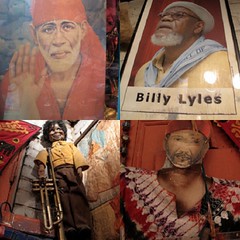The record vendor who toured the world with a disco star isn’t the only East Villager who’s both a musician and salesman: on Ninth Street, jazzman Billy Lyles and his wife, designer Jane Williams, have owned Katinka, an idiosyncratic store no bigger than a walk-in closet, since 1979.
Mr. Lyles, 69, has performed at clubs like the Bitter End, but neighbors know him best for his impromptu saxophone, keyboard, guitar, and flute performances outside of his shop on Ninth Street, near Second Avenue. There, Mr. Lyles interacts with passers-by from his usual position near a table where scented soap and incense are sold for just a dollar. A mural by Chico featuring his likeness – white beard, attentive eyes, saxophone at his lips – adorns an adjacent brick façade. On warm days, shouts of “Billy!” echo down the tree-lined block, and people wave at him from across the street.
“It’s nice to get said hello to,” said Mr. Lyles, wearing his trademark glasses and old-fashioned flat cap. “To be a nice person, man: they don’t have that going on any more like they used to.”
A protégé of the eccentric jazz legend Lawrence Wheatley and the saxophonist Pharoah Sanders, Mr. Lyles describes his brand of “folk jazz” as eclectic. His longtime neighbor Michael Lydon, a founding editor of Rolling Stone magazine, said, “He plays [with] what I would call an authentic jazz feeling. He knows his music.”
Pam Pier, owner of Dinosaur Hill, a children’s store across the street from Katinka, said that without Mr. Lyles, the neighborhood would be “dimmer, quieter – not as colorful, not as melodic.”
And it’s true that it would be less colorful: Katinka bursts with shawls, handbags, jewelry, and shoes that the musician and his wife, who live above the shop, have brought back from their travels in India. Alongside exotic artifacts like Tibetan masks, there are posters of two white-bearded men: Sai Baba of Shridi, an Indian saint and mystic, and Mr. Lyles.
The store, open just three hours a day (from 4 p.m. to 7 p.m.), is a labor of love. “We don’t have a lot of money,” said Mr. Lyles. “We’re struggling.” The shopkeeper declined to discuss his rent other than to say that his landlord didn’t bother him, but said that his store has stayed afloat for so long because it sells items that “fit everybody’s pocketbook.”
That isn’t the only thing: To many local residents, Mr. Lyles represents a golden age of community harmony – a time when acquaintances stopped to chat in the street.
“He’s a throwback – one of the true characters of what the East Village used to be,” said Jason Birchard, general manager at Veselka, which is across the street from Katinka. “He’s not your ordinary shopkeeper.”
With a slight chuckle, Mr. Birchard added, “He’s always looking to talk. He’s a man of many words.”
When it comes to conversation, Mr. Lyles is a strict constructionist: failure to return his greeting could mean being ejected from his shop.
“You have people who walk into the store, and you could say hello to them and they won’t even respond back,” said Mr. Lyles in a Southern drawl that hasn’t faded after more than three decades in New York. “And I have to tell them, ‘Listen, you’re in my space, I said hello to you, and if you can’t show me that kind of respect, you’re gonna have to leave.’ I have to tell them that.”
Deborah Johnstone, a writer who used to regularly shop at Katinka, said, “He comes from a different era.” Ms. Johnstone found Mr. Lyles to be “such an interesting guy” that in 2005 she portrayed him in a monologue at the Metropolitan Playhouse theater.
Other artists have also incorporated him into their work. The Kennedys, a folk rock band, wrote a song entitled “9th Street Billy,” which begins:
9th Street Billy knows it all, he shares his wisdom free
If you need a good word or a fine silk shawl, Billy is the man to see
He can pull down a song from the middle of the air
Call out the spirits over Tompkins Square
Oh, 9th Street Billy, the guru of East Side soul
Back on Ninth Street, Ms. Pier smiled wishfully as she spoke of her neighbor. “If there was a mayor of every block,” she said, “and everybody could just sit for a second on the stoop and share a story and hear some music, [the city] would be a much better place to live.”
She added, “But that’s, you know, pie in the sky.”







